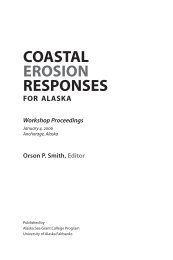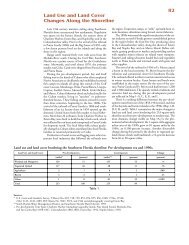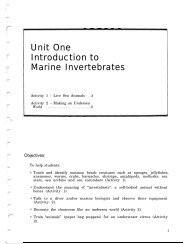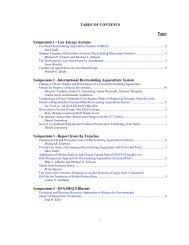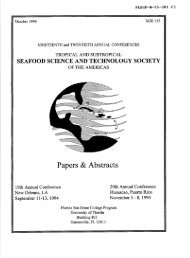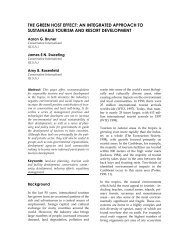Full document / COSOC-W-86-002 - the National Sea Grant Library
Full document / COSOC-W-86-002 - the National Sea Grant Library
Full document / COSOC-W-86-002 - the National Sea Grant Library
- TAGS
- nsgl.gso.uri.edu
Create successful ePaper yourself
Turn your PDF publications into a flip-book with our unique Google optimized e-Paper software.
Application of <strong>the</strong> doctrine of Implied dedication to beach access is a<br />
relatively new one among state courts. Historically, <strong>the</strong> doctrine was<br />
applied to <strong>the</strong> dedication of roods and parks. Mississippi is no<br />
exception. Therefore, it is necessary to draw parallels from such<br />
situations. Armstrong v. Itawamba, a case dealing with <strong>the</strong> issue of<br />
whe<strong>the</strong>r a road across private land had acquired public road status, is<br />
an enlightening example. The court found that a dedication had<br />
resulted froo continual public use and maintenance of <strong>the</strong> road at<br />
public expense for nearly twenty years. Although <strong>the</strong> facts clearly<br />
show an Implied dedication, <strong>the</strong> court did not categorize it as such.<br />
Its first specific discussion of Implied dedication arose when members<br />
of a community attempted to prevent <strong>the</strong> city of Louisville from using a<br />
particular tract of land in a manner that waB Inconsistent with Its use<br />
as a public park. (Hull, 1974). The test set out by <strong>the</strong> court<br />
requires "long use for a specific public purpose, <strong>the</strong> discontinuance of<br />
which constitutes a violation of good faith to <strong>the</strong> public and to those<br />
who have acquired property with a view to <strong>the</strong> use contemplated by <strong>the</strong><br />
dedication." (Hull. 1974). Here, tho city's prior Inconsistent use<br />
demonstrated that <strong>the</strong>re was no Intention to dedicate <strong>the</strong> property for a<br />
specific public purpose (i.e., a park). Therefore, It was just as<br />
reasonable to conclude that <strong>the</strong> city had Intended to continue use of<br />
<strong>the</strong> land as a park only until it was needed for o<strong>the</strong>r purposes as it<br />
was to imply that <strong>the</strong> property had been dedicated.<br />
How <strong>the</strong>n, would public access to Mississippi's coastal beaches fare<br />
under <strong>the</strong> Itawamba and Hull standards of Implied dedication? In<br />
order for <strong>the</strong> court to find an implied dedication, requirements as to<br />
duration and character of use must be mot. The character of <strong>the</strong> use<br />
must be adverse to, and oxclualvo of, <strong>the</strong> rights of <strong>the</strong> property owner<br />
(except as a member of <strong>the</strong> public). Unlike prescriptive rights, which<br />
vest in Individuals, <strong>the</strong> claim of right being asserted must be on<br />
behalf of <strong>the</strong> public as a whole. The uso must be with <strong>the</strong> knowledge of<br />
<strong>the</strong> property owner, or under such circumstances that would warrant<br />
charging him with knowledge. With <strong>the</strong> exception of <strong>the</strong> current owner,<br />
previous owners of Deer Island have long acquiesced in <strong>the</strong> public's use<br />
of <strong>the</strong> Island beaches for recreational purposes. Similarly, few<br />
objections have been lodged against <strong>the</strong> open public use of <strong>the</strong> sand<br />
beaches of Harrison and Hancock counties since <strong>the</strong>ir establishment.<br />
Under <strong>the</strong> Hull standard, It would be a violation of good faith to <strong>the</strong><br />
public to discontinue such long use for <strong>the</strong> specific public purposes of<br />
navigation, bathing, fishing, and o<strong>the</strong>r recreational activities.<br />
As noted above, public use can constitute acceptance of an offer to<br />
dedicate. Because such use does not need to be constant, <strong>the</strong> fact that<br />
<strong>the</strong> beaches arc less populated in winter months does not Interrupt<br />
continuity of <strong>the</strong> use. And on Deer Island, <strong>the</strong> public continues to<br />
utilize Deer Island, effectively Ignoring efforts of tho current owner<br />
to restrict such use. It should be noted that a succeeding landowner<br />
takes <strong>the</strong> property with <strong>the</strong> burden of an established dedication.<br />
Finally, at least for <strong>the</strong> boachas of Harrison and Hancock counties,<br />
government funds are used to maintain <strong>the</strong>n. Continued use over a<br />
period of time, combined with maintenance at public expense, was<br />
sufficient for <strong>the</strong> Armstrong court to find Implied dedication of a<br />
road; it should certainly suffice hero.<br />
Although <strong>the</strong> Mississippi courta have yet to apply implied dedication<br />
concepts to beach access Issues, othor state courts have set <strong>the</strong><br />
607




